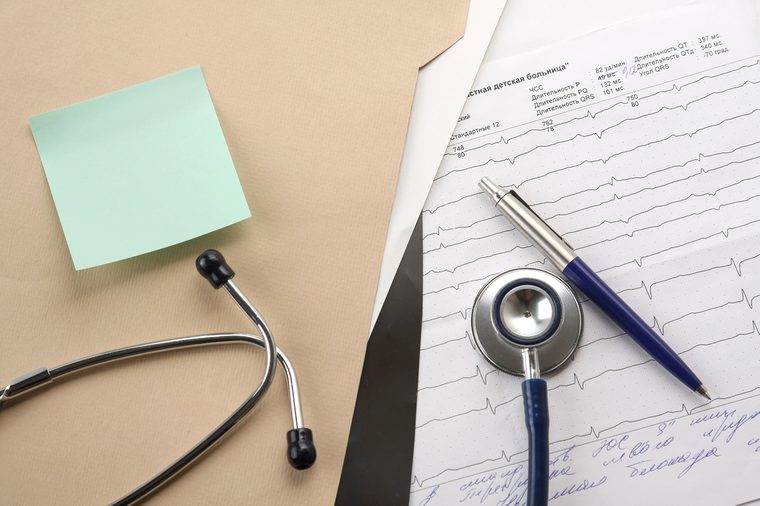
Getting to the appointment late
Your doctor will have less time to spend with you if you can’t make it on time, according to the Cleveland Clinic. Make sure you have reliable transportation, know where the office is, and be sure to arrive about 15 minutes prior to your appointment so you can fill out the necessary paperwork. And be sure to let the front desk staff know you’ve arrived. “Doing so will give you plenty of time to check in and have your vitals (height, weight, blood pressure) taken before your appointment time,” according to the Cleveland Clinic experts.

Holding back info on how you’re feeling
While you may find some symptoms uncomfortable to discuss, don’t be embarrassed or hesitant to bring up anything and everything. “Leaving out details or lying to your doctor can be bad for your health because it affects your care, so tell your doctor everything. Honesty is definitely the best policy—especially for your health,” according to the Cleveland Clinic. Here are some insider tips on finding a great doctor.

Not having a list of your medications
Always bring a complete list of all the medications—and supplements—that you’re taking, advises Nesochi Okeke-Igbokwe, MD, a physician and health and wellness expert. “This information becomes crucial for any doctor evaluating and treating a patient so that the provider can determine which medications are critical to continue, stop, or adjust. Especially when a patient requires initiation of a brand new medication, the doctor must know the thorough list of all medications to avoid prescribing anything that may cause dangerous interactions.”
To be more prepared: If you are unsure about your complete list of medications, you can always give your pharmacy a quick call prior to your doctor’s appointment to determine the medications that you have filled in the past, she says.

Not keeping track of any medication allergies
If you are unaware of your medication allergies, it becomes difficult for your physician to come up with an appropriate treatment plan for you, explains Dr. Okeke-Igbokwe. You can keep track, she says: “There are various downloadable apps that allow patients to keep track of such things as medication allergies, medication list, etc. Anytime you have a reaction to any medication, update and save your records.”

Leaving out parts of your medical history
Dr. Okeke-Igbokwe says sometimes patients do not fully disclose critical information about their medical history. When obtaining a history from a patient, there are certain questions about their social history that a doctor must routinely ask. “This includes questions about one’s drug history, sexual history, and family history. Sometimes patients do not divulge key information that their physician must be aware of because they may be embarrassed or even fear being judged,” she adds. “Patients should understand that their doctor needs all the important details of their history to be able to provide them with the best care possible.” Find out the other things your doctor is really thinking, but won’t say to your face.

Not bringing records from your previous physician
Kaushal Kulkarni, MD, a neuro-ophthalmologist in San Diego, CA, says one of the most prevalent mistakes he sees is patients arriving at a doctor’s appointment thinking that their previous doctor’s office has sent over their records. Another potentially risky issue is assuming a new doctor doesn’t need to hear your past diagnoses and will somehow figure everything out with the first visit. “The best advice I can give is to obtain your old records yourself, organize them chronologically, and hand-deliver them to your new doctor’s office,” he recommends. “If you have had an X-ray, CT scan, or MRI, get a copy of a CD with the actual images on it (not just the report) from the radiology department, and carry it with you to the new doctor’s office. Do not rely on another doctor’s office to fax, mail, email, call, or transfer your records for you. Chances are, they either won’t do it, or it will get lost.” Plan ahead and use these tips to make the most of your next doctor’s appointment.

Not bringing someone with you
Not everyone will need this, but if you feel like you’d like someone with you, bring a family member or friend. Patient advocate Teri Dreher, RN, of NShore Patient Advocates in Chicago, says it’s helpful to have someone else hear the diagnosis, the treatment, and the prognosis. “During the visit, your ‘health buddy’ can bring up what you may be reluctant or embarrassed to ask and take comprehensive notes,” Marie Savard, MD, told ABC News. “A health buddy is also indispensable after leaving the doctor’s office, helping you follow through on what the doctor advises.”

Being hesitant to ask questions
If something doesn’t make sense to you or the doctor uses a term you don’t understand, ask for clarification, says Dreher. Whether it’s confusion over medication, symptoms, or follow-up care at home, ask the doctor while you have her time so that you can leave with a sense of comfort. Ted Epperly, MD, a clinical professor of family medicine at the University of Washington School of Medicine told TIME: “Asking questions is one of the best ways to ensure you and your doctor are on the same page. And if your doctor doesn’t seem interested in answering, or you get a negative response, you need to find a new doctor.” Check out more medical tips doctors and nurses wish you knew.
